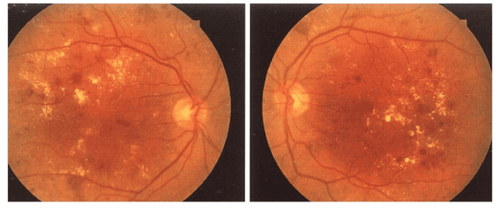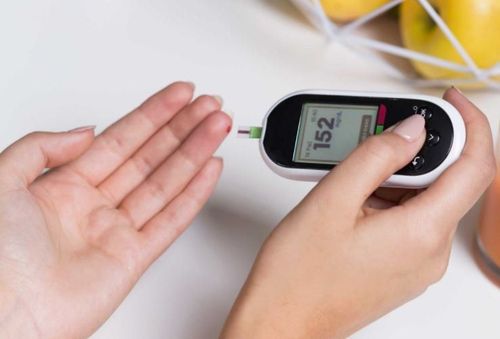This is an automatically translated article.
The article was professionally consulted by Specialist Doctor II Nguyen Thai Hung - Department of Medical Examination & Internal Medicine - Vinmec Danang International Hospital. Specialist II Nguyen Thai Hung has 13 years of experience as a doctor treating eye diseases.Currently, the rate of people with diabetes is increasing and causing many dangerous complications for the heart, liver and eyes. One of the complications caused by diabetes is retinopathy that affects the patient's vision.
1. The concept of diabetic retinopathy
Diabetic retinopathy usually develops in people with type 1 or type 2 diabetes and progresses over many years. There are two types of diabetic retinopathy that can potentially cause vision loss:Non-proliferative diabetic retinopathy: are damaged retinal blood vessels that can become blocked or deformed. Fluid, fat, and protein leak out of the abnormal blood vessels. The fluid is localized in the retina, causing edema, leading to impaired sharp vision for the patient. Proliferative diabetic retinopathy is caused by the growth of structurally abnormal blood vessels on the surface of the retina. These blood vessels can cause bleeding. This disease can cause retinal detachment, which is the separation of the layers of the retina, which is one of the most severe consequences of proliferative retinopathy.
2. Signs of Diabetic Retinopathy

Occasionally the eyes lose the ability to perceive colors. Feeling blurred vision. Sometimes eyes will see dark spots or flashes of light. Eyes often blurred when reading or driving. See your doctor to check if you have any of the above symptoms.
3. What Causes Diabetic Retinopathy?
If not treated early, diabetic retinopathy can lead to permanent damage to the retina. In the structure of the eye, the retina is the layer containing nerve cells at the back of the eye, which is responsible for receiving light to create images. The reason people with diabetes are at risk of retinal detachment is because too much glucose in the blood (blood sugar) for a long time will block the tiny blood vessels that nourish the retina. The patient's eyes try to make new blood vessels, which are not growing as they should. As a result, they cause bleeding and effusion into the retina, in some cases causing macular edema, blurred vision.As the disease progresses, more blood vessels will be blocked. Fluid escaping from the blood vessels accumulates and causes the retinal layer to separate. If not detected early, the patient can potentially go blind forever.

4. How to get diabetic retinopathy
To deal with diabetic retinopathy, patients should seek out reputable medical facilities for diagnostic and treatment methods.Currently at Vinmec Times City International Hospital, Pascal beam laser is being applied with many advantages. This is the most advanced retinal laser photocoagulation device in the world today, overcoming many disadvantages of today's common lasers. The laser effect time on the retinal tissues is very short, does not cause extensive burns around the laser area, so it helps to control the desired effect, causing less damage to the retina around the laser area. Besides, this is a safe method of treating the macular area. Moreover, this method causes no or very little pain, minimizing complications and side effects of the laser.
Please dial HOTLINE for more information or register for an appointment HERE. Download MyVinmec app to make appointments faster and to manage your bookings easily.














